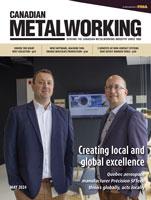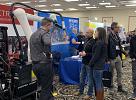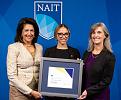- FMA
- The Fabricator
- FABTECH
- Canadian Metalworking
Preview: Medical Manufacturing Innovations Toronto 2012
A look ahead at what to expect at MMI Toronto 2012.
- By Nick Healey
- October 15, 2012
- Article
- Metalworking
In Canada’s metal machining (and today, additive manufacturing) industries, most of the attention goes to the automotive, energy and aerospace industries. Measured by “pounds on the ground”, that’s understandable, but there’s a market where parts weighing grams can generate big profits for advanced shops: Medical manufacturing. How big is the market in Canada? Canada is home to a $7-billion medical device market—of which $4-billion is centered in Ontario’s medtech hub. Demographics also suggest that the segment is poised for significant growth.
“Canada’s aging population will increasingly rely on medical innovations like joint replacements and dental implants to retain a high quality of life,” said Janine Saperson, event manager for the Society of Manufacturing Engineers (SME), organizer of the event. “New innovations in the production of these technologies are essential for businesses looking to increase presence in this market or charter new territory and Medical Manufacturing Innovations Toronto 2012 offers a one-of-a-kind opportunity to obtain the tools and knowledge necessary to make these innovations possible.”
Segments like aerospace and automotive have specific needs for accuracy, precision, surface finish and of course, cost, but medical/dental applications introduce extensive recordkeeping, lot traceability and regulatory compliance issues. MMI Toronto is Canada’s event for medical & dental device manufacturers to compare and source solutions for their manufacturing challenges and learn about the newest innovations and technologies.
In addition to a comprehensive seminar schedule (see list on page 22), MedTech Labs are unique interactive sessions that take place right on the show floor, giving attendees a firsthand look at new industry developments, as well as the opportunity for one-on-one interaction with suppliers.
Lauralyn McDaniel, Medical Industry Manager for SME, explains that medical and dental manufacturing is a burgeoning sector represented by a highly diversified group of companies ranging from small start-ups to large, mature firms. “This is a market that is expected to grow to more than $7 billion by 2014, fuelled by the need to support aging populations, the resulting chronic disease incidence and an increased demand for quality of life solutions,” she says, noting that MMI Toronto 2012 aims to be the “go to” event for device manufacturers looking for innovative ways to respond. “The industry is not without its hurdles, however, which is why events like MMI Toronto 2012 are so important,” she added.
In a recent survey conducted by SME, North American manufacturers of medical and dental devices indicated that they face many innovation challenges, including how to get products to market quickly, attain necessary engineering resources, meet stringent regulatory requirements, and justify the value of improvements compared to the time and resources required to achieve them. At MMI Toronto 2012, they will learn about the latest technologies and solutions available to help address those challenges, and will have an unprecedented opportunity to network with industry peers, government officials and key medical and dental device professionals, McDaniel explained.
Building on the success of its inaugural event in 2010, MMI Toronto 2012 has grown substantially, offering significantly more exhibits and educational sessions than before. “As Canada’s only event to focus solely on medical devices, MMI Toronto 2012 brings together a unique combination of suppliers who are familiar with Health Canada and other regulatory processes and puts them in direct contact with the device manufacturers who can support them in achieving those requirements,” she said.
MMI 2010 was a notable success
“The Medical Manufacturing Innovations event provided an excellent opportunity for our office” stated David Di Felice Chief, SME Stakeholder Engagement at the federal Office of Small and Medium Enterprises (OSME). “We were able to engage numerous suppliers from the medical and dental manufacturing industry and inform them about the Canadian Innovation Commercialization Program (CICP), as well as on the opportunity to do business with the Government of Canada. The seminar session we were able to deliver was equally productive.”
Medical and Dental Machining’s Howard Blatt agrees: “Being approached by SME to be a participant in this event, I was very reluctant to attend. Having done the big Chicago and New York MD& M shows and generating very few leads, I now compare MMI Toronto show to these shows and I had seven times as many leads as I had in the other two shows combined. Our objectives were met with attaining the number of bona fide leads and immediate e-files being sent to our office. How else can you validate success other than through numbers? The numbers we achieved attest to a success. I look forward to next year at the second annual event.”
In addition to showcasing new manufacturing technologies, MMI Toronto 2012 will focus on outsourcing strategies, innovation challenges and solutions, ways to navigate through the regulatory environment and new developments in inspection and validation technologies. Featured application areas include: pharmaceuticals, medical and assistive devices, biotechnology, advanced materials, microelectronics, telecommunications, software and informatics.
The estimated seven billion dollar Canadian medical and dental device industry employs 35,000 people across 1,500 companies, with the majority of activity taking place in Ontario and Quebec. Most shops are currently working with non-ferrous metals like aluminum and titanium alloys, plus stainless steel grades including the traditional “300” series also familiar to aero/auto shops. A major difference between medical and conventional machining is in material choice. In many cases, it’s controlled by regulations driven by in-vitro and in-vivo testing. Machinability, cost and availability are always trumped by biocompatibility, adding new issues in raw material procurement, certification and job costing. Unconventional post-machining processes are also in play, such as ultrasonic cleaning, grit blasting, sterilization and pharmaceutical coatings. Subcontract work with net or near net shape parts is a good way to break into the medical market within a traditional shop’s comfort zone, but the bottom line is that no part is as safety-critical as one designed to work inside a human body. MMI hosts companies with the best equipment, technology and knowledge, who understand Health Canada/FDA compliance specifications and will showcase their latest medical manufacturing solutions. It’s a great place to investigate the market and determine what’s needed to prepare a quality shop for entry into this highly specialized market.
MATSUURA 5-axis offers larger working envelope:
As with all Matsuura 5-axis products, the MAM72-100H is designed to function best with flexible multiple setups, process a wide array of materials in a multitude of industries, and offer users advanced, proven and extended unmanned operation. Process integration and high-precision complex “one hit” operation come as standard. Matsuura has developed the MAM72-100H following many requests from existing MAM72 users for a machine with a larger working envelope and processing capacity.
EC60 flat servo motor with MILE encoder:
Maxon’s Inductive Little Encoder (MILE) encoder is one of the smallest inductive rotary encoders and makes optimal use of the flat motor in high-precision applications and positioning tasks. Its operating principle is based on the detection of high-frequency inductivity, which generates eddy current in an electrically conducting target.
There are advantages of a high-frequency inductive method of measurement compared to traditional encoders. One is resistance towards dust or oil vapour, making additional protective measures, such as a cover, unnecessary. Also, it’s resistant to interference pulses (for example from PWM controllers or motor magnets).
NSK America’s NRR 3060 QC Spindle
NSK America has announced the introduction of their high precision, NRR-3060 QC Spindle. The NRR-3060 QC now allows an end user to utilize preset tooling. Designed to meet the needs of specialty and bench machining requirements, the NRR 3060 QC is capable of attaining speeds as high as 60,000 rpm while maintaining less than 1 micron runout at the spindle taper.
Designed to use up to a 1/4” collet, the NRR 3060 QC allows for quick, and accurate tool changes without the need for wrenches. The tool holder has the ability to be placed in a preset adaptor, which can be put on a presetter unit to provide accurate information for the offset values of the tooling.
About the Author
subscribe now


Keep up to date with the latest news, events, and technology for all things metal from our pair of monthly magazines written specifically for Canadian manufacturers!
Start Your Free Subscription- Industry Events
MME Saskatoon
- May 28, 2024
- Saskatoon, SK Canada
CME's Health & Safety Symposium for Manufacturers
- May 29, 2024
- Mississauga, ON Canada
DiPaolo Machine Tools Open House 2024
- June 4 - 5, 2024
- Mississauga, ON Canada
FABTECH Canada
- June 11 - 13, 2024
- Toronto, ON Canada
Zoller Open House & Technology Days 2024
- June 12 - 13, 2024
- Ann Arbor, MI























